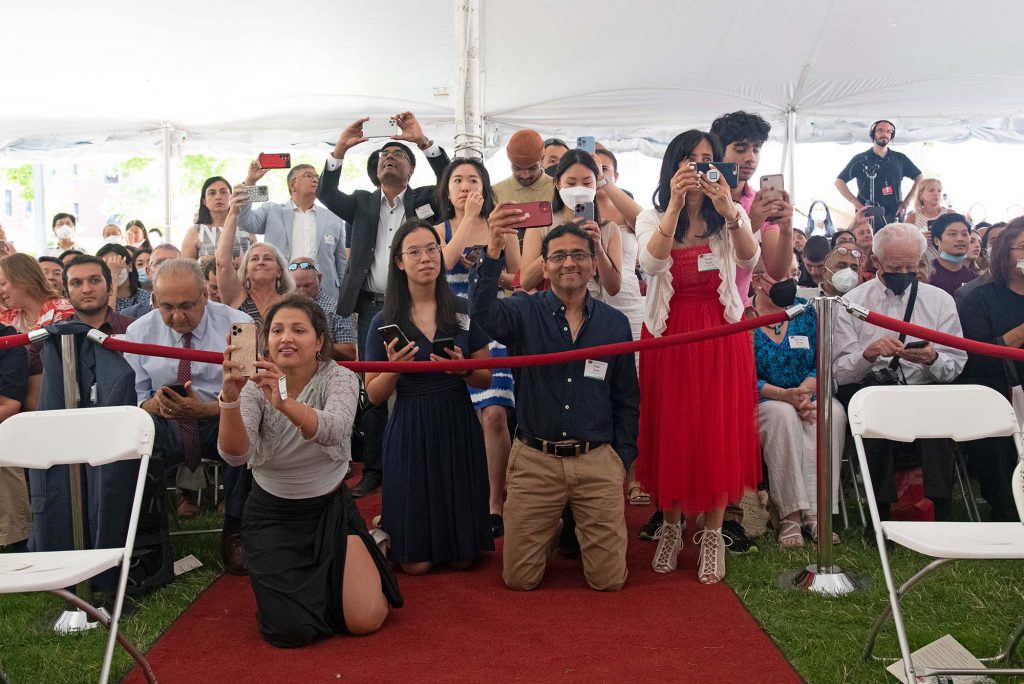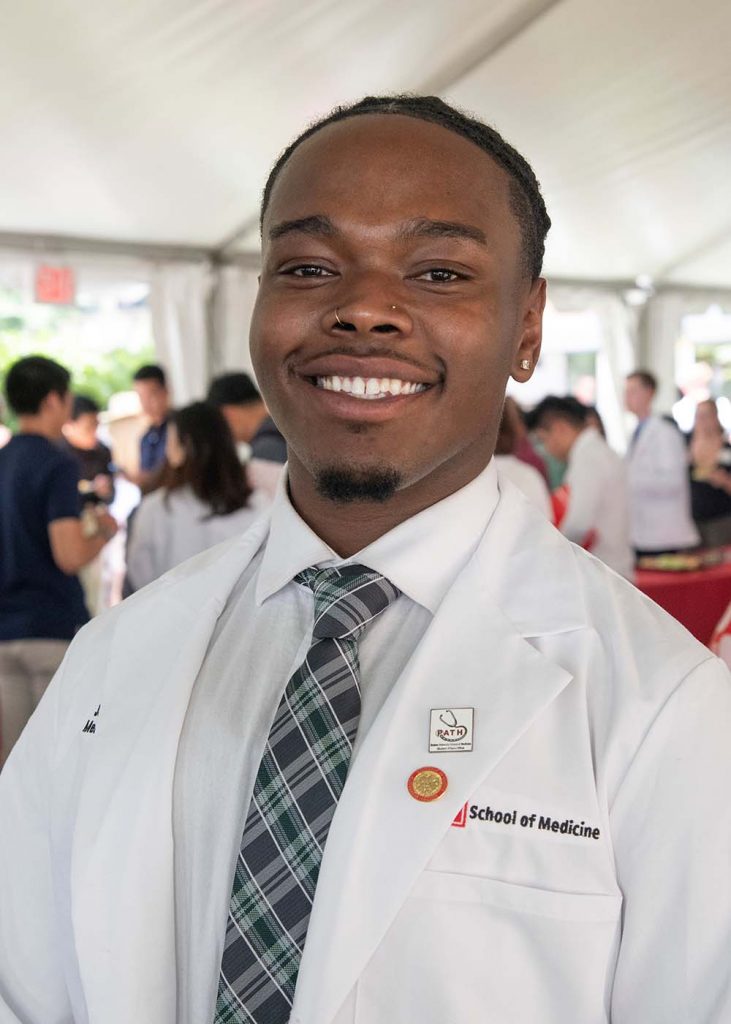School of Medicine Welcomes Class of 2026 at White Coat Ceremony

First-year medical students during the ceremony recite the Hippocratic Oath for the first time, signaling their entrance to the study of medicine.
School of Medicine Welcomes Class of 2026 at White Coat Ceremony
Students are told to expect “an amazing, incredible ride”
It’s an annual rite of passage. Each year, the School of Medicine welcomes its entering class of students during a White Coat Ceremony, which marks their official entry into the study of medicine.
On August 1, Angela Jackson, MED associate professor of medicine and associate dean for student affairs, welcomed the smiling group of family and friends gathered to witness the Class of 2026 receive their white coats, which she said represent “visible evidence that they are joining this profession, taking their first steps along this path leading to a demanding but rewarding and meaningful career in medicine.”
Vincent Smith, MED professor of pediatrics, welcomed the students, gathered under a big, white tent Monday on Talbot Green, to what he called “the noblest of professions.”
“It will bring you joy. It will bring you pain…. There will be highs and there will be lows, but, overall, it will be an amazing, incredible ride,” said Smith, this year’s guest speaker.

The heart of the ceremony is the presentation of the white coats. Faculty advisors the medical students will have over the next four years help each incoming student slip into their white coat, embroidered with their name, which is symbolic of the medical profession.“When you put that white coat on for the first time today, the message is not that you are expected to become a professional, but that, as of today, you are now already a part of the profession,” said Karen Antman, MED dean and provost of the Medical Campus. The White Coat Ceremony is one of the rare moments during their medical education when the entire class gathers together. In presenting the class to Antman, Kristen Goodell, associate dean for admissions, shared some statistics. The 159 members of the 174th entering class were selected from a pool of more than 11,400 applicants. They hail from 30 states and 30 countries and speak 26 languages.
“As we welcome you…our shared intention is for you to reach your goals, so that you can set about making the world a better place,” Goodell said.
But even superachievers are challenged by medical school.
“You and your classmates will have challenges, that’s normal in medical school,” cautioned Antman. “It’s supposed to be hard; if it were easy, anybody could do it,” she added, paraphrasing a quote from the movie A League of Their Own.
Newly coated Justin Grant (MED’26) said he felt like he’d come a long way with a lot more still in front of him. An Atlanta native who graduated from Morehouse College, Grant participated in MED’s Early Medical School Selection Program, an early assurance program developed in 1982 that seeks to diversify the physician workforce.

“I’m not very nervous or anxious right now, I feel very good,” Grant said.
Brittny Garcia is from the Rio Grande Valley, “extremely south Texas.” The University of Texas at Austin graduate chose MED because of its commitment to diversity and its focus on serving underserved populations. She hopes to take what she learns and return to serve her community and others like it.
“I really felt like I was welcomed, and this is where I was supposed to be,” she said. “They really made me feel like I had a place in medicine.”
Guest speaker Smith’s backstory demonstrated that life’s path is rarely straight and predictable. A self-described “short, pudgy kid with thick glasses,” Smith said he grew up in Texas bookish, Black, and gay. One teacher told him Black kids never amounted to anything, and another predicted he’d be dead or in jail by 21.
But Smith had his champions, a supportive mother and “help from people who had nothing to gain from helping me.”
He graduated from Texas A&M University, Stanford University School of Medicine, and Harvard T.H. Chan School of Public Health. He trained in pediatrics at Boston Children’s Hospital and Boston Medical Center (BMC), BU’s primary teaching hospital, in the Boston Combined Pediatric Residency Program. Now, he serves as BMC’s division chief of newborn medicine.
“I wish I could tell you that my path was well-planned, and that I thought it all out and it all went according to plan, but that’s just not true,” Smith told the assembled audience.
His grandmother, who lived to 104, told him age brings understanding, and, with that in mind, he passed on advice he said he would have given his younger self: hang on, life gets better; inner beauty eclipses outward appearance; and make the best decision you can with the information you have.
“Be generous with your time, love, and resources,” Smith told the students. “What you get back in return is immeasurable.”
Comments & Discussion
Boston University moderates comments to facilitate an informed, substantive, civil conversation. Abusive, profane, self-promotional, misleading, incoherent or off-topic comments will be rejected. Moderators are staffed during regular business hours (EST) and can only accept comments written in English. Statistics or facts must include a citation or a link to the citation.